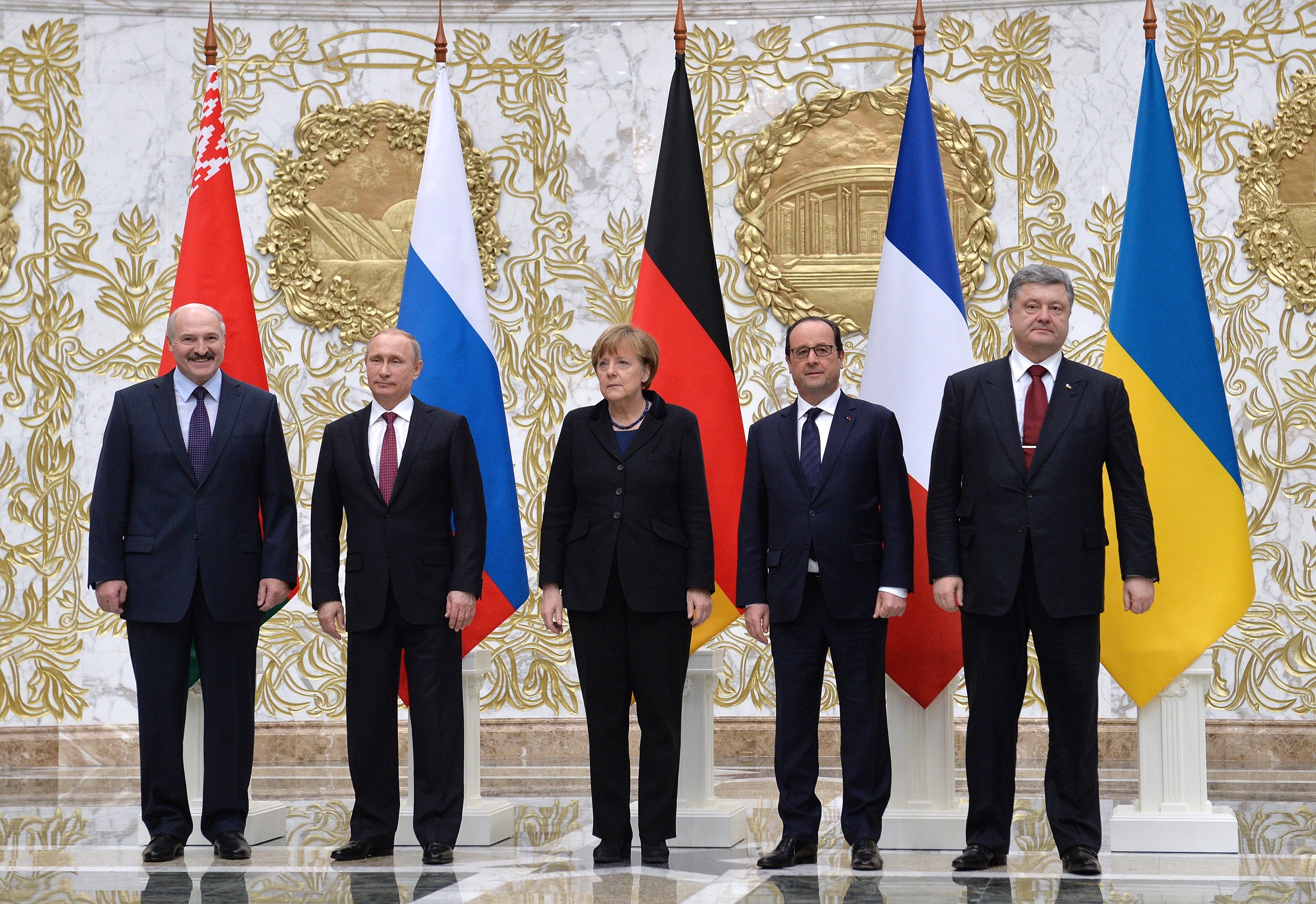ID :
357045
Thu, 02/12/2015 - 09:26
Auther :
Shortlink :
https://oananews.org//node/357045
The shortlink copeid
14-hour Normandy Four marathon talks in Minsk end

MINSK, February 12. /TASS/. The talks of Russian President Vladimir Putin, Ukrainian President Petro Poroshenko, French President Francois Hollande and German Chancellor Angela Merkel have been concluded.
The leaders have left the negotiations hall - first Poroshenko, then Putin, who was followed by Hollande and Merkel.
The diplomatic marathon talks have lasted for more than 14 hours. These are the lengthiest talks in President Putin’s career.
The meeting is expected to result in a document on settling the conflict in Ukraine’s south-east.
The talks began on Wednesday evening and have not finished by 6.30 a.m. local time on Thursday.
Members of the delegations refrain from comments on the talks.
The summit has been held behind closed doors and only sometimes the leaders were leaving the negotiating room but in a span of few minutes were back there again.
The four leaders started the talks in a narrow format but invited members of the delegations to participate in the discussion when it was required.
On February 7 German Chancellor Angela Merkel and French President Francois Hollande arrived in Kiev for talks with Poroshenko with the aim to settle the crisis. The next day the European leaders arrived in Moscow for talks with Putin.
On Sunday, February 10, the ‘Normandy Four’ comprising Russia, France, Ukraine and Germany discussed the most recent developments by phone and appointed a meeting in Minsk for Wednesday.
In the brief interval between the meetings in Moscow and Minsk, Merkel visited Washington for talks with Barack Obama. She said after the meeting that one more attempt to settle the conflict in Ukraine should be made, adding that she would have never pardoned herself if this attempt had not been made.
Hollande told reporters before departure for Minsk he was leaving with a firm conviction a much-desired compromise solution would be found eventually.
Poroshenko said before boarding the jet in Kiev was going to Minsk to cease fire and open a political dialogue immediately and unconditionally.
Combat actions between the Ukrainian military and militias of the self-proclaimed Donetsk and Lugansk People’s Republics during Kiev’s military operation in the country’s east conducted since mid-April 2014 have claimed over 5,400 lives and displaced nearly a million people to flee their homes seeking refuge in neighbouring countries, mostly in Russia, according to UN data.
Mediatory efforts of Russia and the OSCE yielded results on September 5 when talks between the parties to the Ukrainian conflict were held in Belarusian capital Minsk two days after Russian President Vladimir Putin proposed his plan to settle the situation in east Ukraine.
Two weeks later, on September 20 the Contact Group adopted a memorandum on implementing a ceasefire. The nine-item document includes a ban on all weapons, pulling back heavy weapons from the line of engagement and setting up a buffer zone of 15 kilometres. It also entrusts the OSCE with a task of controlling implementation of the agreements.
On December 9 the parties to the conflict announced "the regime of silence" in the area of Kiev’s combat operation in Donbass aiming to come over to implementation of the Minsk accords. Both Kiev and the self-proclaimed republics declared an urgency to pull back heavy weapons, to exchange prisoners of war and to demilitarise the region.
On January 12 the foreign ministers of the "Normandy Quartet" comprising Germany, France, Russia and Ukraine held a meeting in Berlin. The ministers noted at the negotiations their readiness to meet in the coming week following the political directors’ meeting as a condition.
In late January the situation deteriorated after a passenger bus en route from Donetsk to Zlatoustovka came under shelling on January 13. Twelve civilians were killed and at least 16 wounded. Artillery shelling and bombing strikes at Donbass cities have intensified and dozens of peaceful civilians, including women, children, and the elderly, died in them.
Read more





